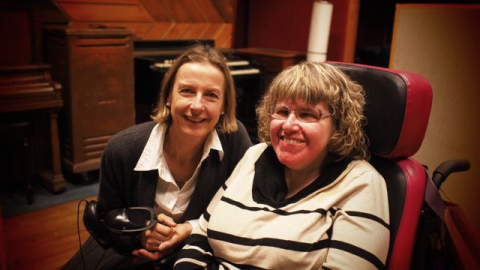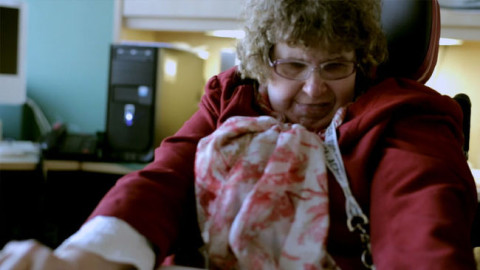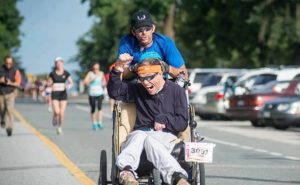By Lauren Stinson
We Regret to Inform You… (2015), is an 11 minute documentary short that confronts the societal idea that having a physical disability limits your academic capabilities, and overall productiveness by showing it is untrue. Created by Eva Colmers and Heidi Janz, the film’s focuses on Dr. Heidi Janz, a Ph.D. recipient living with cerebral palsy, who has recently lost her job at a university. Janz is not only the star of the film, but is also the co-director. The film follows Dr. Janz’s journey, while exploring social issues like the administration as well as denial of disability benefits from the Canada Pension Plan (CPP).
The strength and power of We Regret to Inform You… is created through the film’s structure and visual direction. The film’s style creates authenticity in the story telling. The visual aspects, paired with the fact that Dr. Janz is co-directing a story about her life with cerebral palsy, brings the film to a level of genuineness rarely seen when looking at narratives of disability on film. This authenticity is used to explore the imaginary idea that physical disability is incompatible with academic accomplishment and a productive life.
Structure
The structure of the film is what makes We Regret to Inform You… the hard-hitting, raw documentary that it is. The camera tracks Dr. Janz as she moves throughout her day, enlightening the audience on the physical support she receives including assistance getting out of bed and brushing her teeth. It does not sugar-coat her disability, instead the film simply showcases her disability and limitations for what they are. Films often try to hide disability or downplay its effects, so it was refreshing to see physical disability displayed in an unapologetic, candid way.
This authenticity within the film captures her accomplishments and work ethic. The camera draws your attention to her many diplomas and her work at the university. We Regret to Inform You… presents Dr. Janz as a complete person who is well educated and productive and just happens to have cerebral palsy.
Visual Direction
The visual narrative of Dr. Heidi Janz traveling throughout her day is overlaid with messages from the CPP stating that her request for disability assistance has been declined. One of the central reasons given for the denial is, “The fact that [Janz was] able to attain a Ph.D. and [was] indeed employed for some years. Demonstrates that [she was] too productive to warrant receiving disability payments.” This powerful statement interweaves the mistaken societal belief that one cannot be both physically disabled and needing support, while simultaneously being an educated and productive member of society. This is a harmful and close-minded assumption that ultimately places all physically disabled people in a box of unproductiveness. The original title for this documentary was Boxes are for Dead People,” which, speaks boldly to this point. When in actuality needing assistance with physical limitations and being educated and productive are unconnected entities.
The disabled narrative is often told with an able-bodied viewpoint structured around overcoming disability and thriving towards an able-bodied ideal, therefore assigning the able-bodied ideal an attached value. This value is decisively linked to productiveness and achievement within our society, meaning that the more abled-bodied someone appears is equated to their overall value and consequently their productiveness as human beings. This is where the societal idea of having a physical disability and being seen as an unproductive individual draws a parallel; however it is untrue – a mere myth.
Authenticity in disability
This is why it is of utmost importance that the film industry gains more disabled directors, writers, producers and actors like Dr. Heidi Janz. Through the medium of film, the disabled and cerebral palsy community can craft and mold their own disabled narratives furthering the creation of more authentic portrayals of disability to be consumed by main-stream society. The authenticity of We Regret to Inform You… is what makes the film powerful. Having more people living with disabilities create their stories will ultimately break down stigma and misconceptions about disability, replacing the worn out able-bodied tropes and ideas about disability built into society’s misconceptions. This directly corresponds with the ideas that Dr. Heidi Janz is combating in her film.
One of my favorite scenes in We Regret to Inform You… is where Dr. Janz rolls over a letter from the CPP with her wheelchair. The action has a kinetic energy to it that mimics motion of stomping on the paper. Yet, the action is a disability-charged adaptive motion of stomping, showcasing adaptability and how disabled people interact with the world in a non-able-bodied way. It is more scenes like this that are needed within media to showcase how disabled people really interact and adapt within an able-bodied society, instead of narratives that overlook the disabled perspective and instead display disabled people as functioning in the same manner as someone who is able-bodied.
We Regret to Inform You… is an authentic, raw display of Dr. Heidi Janz’s life with cerebral palsy. The film shows her limitations caused by her disability, yet also showcases her achievements and work ethic. Combating the societal belief that unproductiveness and disability are linked, which the CPP denial of her disability benefits reinforces, Dr. Heidi Janz’s work in this documentary reveals the importance of having the disability voice within film. Her voice and perspective help shatter able-bodied ideas about disability that are often upheld within mainstream film and in turn become societal misconceptions of disability.
We Regret to Inform You… was showcased at DOXA, a documentary film festival in Vancouver, May 8th 2016.The trailer of We Regret to Inform You… can be watched on the National Film Board of Canada’s website, along with a short clip.
Read an interview with the directors here.


 “I love it!” – Peter is a CPABC Movement Ambassador
“I love it!” – Peter is a CPABC Movement Ambassador Dear members: “Straw ban” stigma and response
Dear members: “Straw ban” stigma and response Jillian Bleackley: Making dreams come true
Jillian Bleackley: Making dreams come true Lower Mainland’s hardest working athletic duo and Guinness World Record contenders to have disability fund named in their honour
Lower Mainland’s hardest working athletic duo and Guinness World Record contenders to have disability fund named in their honour

